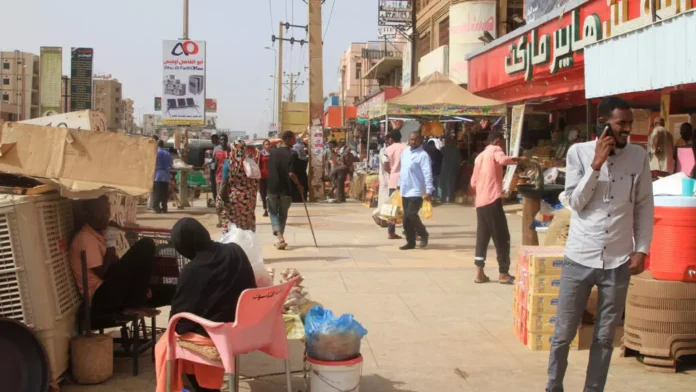Port Sudan (Sudan) – AFP Report Adaptation by Al-Yurae- Drone strikes hit the Sudanese capital Khartoum on Wednesday, triggering a series of explosions across the city, according to a military source and residents who spoke to Agence France-Presse.
The military said its air defenses had intercepted and destroyed most of the unmanned aircraft targeting two major bases—Sarkab and Khalid bin al-Waleed—in the northwest of the capital. “Our air defenses shot down most of the drones,” the source confirmed, adding that emergency teams were deployed to contain fires resulting from the blasts.
Witnesses in Omdurman, across the Nile from Khartoum, reported seeing multiple drones hovering over the city late Tuesday and hearing loud explosions through the night. “It felt like the sky was alive with noise,” said one resident reached by phone.
A War Without End
Sudan has been ravaged by a brutal war since April 2023, when fighting erupted between the national army, led by General Abdel Fattah al-Burhan—the country’s de facto ruler since the 2021 military coup—and the paramilitary Rapid Support Forces (RSF) commanded by his former deputy Mohamed Hamdan Daglo, widely known as Hemedti.
Both sides have been accused of committing atrocities, massacres, and ethnic cleansing as the conflict stretches into its second year with no sign of resolution.
The war has killed tens of thousands and displaced over 13 million people, triggering what the United Nations describes as “the worst humanitarian crisis in the world.” Millions live in makeshift shelters or refugee camps in Sudan’s war-torn regions and neighboring countries.
Drones, Militias, and the Battle for Khartoum
Wednesday’s attack was the latest in a series of strikes targeting army positions and infrastructure around the capital. Although RSF drones previously hit military and strategic sites in September, Khartoum had remained largely quiet since the army regained control in May, shifting most of the fighting to Sudan’s south and west.
On Tuesday, two members of the pro-army militia known as Sudan Shield were killed when drones attacked the city, according to the group’s statement.
Sudan Shield is led by Abu Aqla Kikel, a former RSF commander who defected to the army last year. His forces played a major role in retaking the fertile state of Al-Jazirah but have faced allegations of abuses committed while fighting for both sides of the war.
Return to a Ravaged Capital
Since the army regained Khartoum earlier this year, more than 800,000 residents have returned, hoping to rebuild their lives and reclaim shattered neighborhoods. The government has announced a large-scale reconstruction program and plans to move its headquarters back to the capital from Port Sudan, where it relocated temporarily to escape the fighting.
Yet large parts of Khartoum remain destroyed and cut off from basic services. Electricity outages are frequent, and reconstruction has been slow amid surging food prices and economic collapse. Aid agencies warn that the fragile calm may unravel as the RSF seeks to reclaim lost ground around the capital.
Darfur: A Siege and a Warning
While Khartoum struggles to revive, battles rage on in the vast region of Darfur, where the RSF has laid siege to the city of El Fasher for more than 18 months. El Fasher is the last major city in Darfur not under RSF control—and home to over 400,000 civilians trapped without adequate food or medical care.
The United Nations says famine-like conditions have already taken hold and that hospitals, mosques, and markets face daily bombardment. RSF forces have also targeted several displacement camps in and around the city, prompting fears of massacres driven by ethnic motives.
Humanitarian officials warn that if the RSF succeeds in capturing El Fasher, it would gain complete control of Darfur—extending its influence further south toward South Sudan—while the army would remain entrenched in central and northern Sudan.
The Cost of a Nation at War
For ordinary Sudanese, the suffering continues unabated. With cities bombed, farms abandoned, and millions uprooted, the war has collapsed an already fragile economy and deepened divisions across communities.
In Port Sudan, the government’s temporary seat on the Red Sea coast, officials insist they will rebuild Khartoum and restore basic services. But for many of the displaced, a lasting peace still feels far away—overshadowed by drone strikes, hunger, and the ghosts of unending violence.


